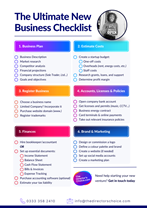Are you looking to start a new business in the UK but don't know where to begin? Starting a new business can be an exciting yet daunting prospect. There are numerous tasks to accomplish, and it requires careful planning, research, and execution to ensure that everything is in order before launching your venture.
In this article, we will provide you with a comprehensive guide on how to start a business in the UK. We will cover the key tasks you need to undertake when setting up your new business, from developing a business plan to creating a strong brand identity and marketing strategy. By following these steps, you can give your new business the best chance of success and lay the foundation for future growth.
So let's dive into each of these categories and explore the essential tasks required for starting a new business in the UK.
1. Business Plan
One of the first steps you should take is creating a business plan. A business plan is a document that outlines your business goals and strategies for achieving them. It serves as a roadmap for your business and can help you secure funding from investors or loans from banks. Here are the key elements to include in your business plan:
a) Business Description
Start your business plan with a brief description of your business. Explain what your business does, who your target customers are, and how your product or service fills a need in the market.
b) Market Research
Conducting market research is an essential step in creating a successful business. You'll need to research your target market, including their demographics, buying habits, and preferences. This research will help you understand your customers' needs and develop strategies for reaching them.
c) Competitor Analysis
Analyse your competitors to understand their strengths and weaknesses. Determine how you can differentiate your business and offer unique value to your customers.
d) Financial Projections
Include financial projections in your business plan, including your startup costs, revenue projections, and cash flow projections. These projections will help you understand how much funding you'll need and when you'll be able to break even.
e) Company Structure
Choose the legal structure for your business, whether that's a sole trader, limited company, or partnership. Each structure has its own advantages and disadvantages, so it's important to research and understand each one before making a decision.
f) Goals and Objectives
Set clear goals and objectives for your business. These should be specific, measurable, and achievable within a set timeframe. This will help you stay focused and motivated as you work towards building a successful business.

Once you've completed your business plan, it's important to revisit it regularly and make updates as needed. Your business plan should be a living document that evolves with your business. Taking the time to create a solid business plan before launching your business can help you avoid costly mistakes and increase your chances of success.
2. Estimate Costs
When starting a new business, it's important to estimate your costs and create a startup budget. This will help you understand how much funding you'll need to get your business off the ground and stay afloat until you start generating revenue. Here are the key elements to consider when estimating your costs:
a) One-off Costs
These are expenses that you'll only need to pay once, such as purchasing equipment, inventory, or furniture. Be sure to factor in any legal fees, permits, or licenses you'll need to obtain.
b) Overheads
These are ongoing expenses that you'll need to pay regularly, such as rent, utilities, insurance, and marketing expenses. Be sure to research and understand the ongoing costs associated with running your business.
c) Staff Costs
If you plan on hiring staff, you'll need to factor in the cost of salaries, benefits, and payroll taxes.
d) Research Grants, Loans, and Support
There are many resources available to help fund your business, such as small business loans, grants, and crowdfunding platforms. Research your options and determine which ones are best suited for your business.
e) Determine Profit Margin
It's important to understand your profit margin, which is the difference between your revenue and your costs. This will help you set prices for your products or services and ensure that you're generating enough revenue to cover your expenses and make a profit.

Starting a new business can be expensive, but careful planning and budgeting can help you manage your costs and increase your chances of success.
3. Register Business
Once you've created your business plan and estimated your costs, it's time to register your business. This will give your business a legal identity and protect your personal assets from business liabilities. Here are the key steps to follow when registering your business:
a) Choose a Business Name
Your business name is an important part of your brand identity. Choose a name that's easy to remember and reflects your brand values. Be sure to research your chosen name to ensure that it's not already in use by another business.
b) Limited Company? Incorporate It
If you plan to operate as a limited company, you'll need to incorporate your business with Companies House in the UK. This process involves registering your company name, choosing directors, and issuing shares.
c) Purchase Website Domain (www.)
A website is essential for any modern business. Purchase a domain name that reflects your business name or brand, and make sure that it's available to use.
d) Register Trademarks
A trademark is a symbol, word, or phrase that identifies your brand and distinguishes it from other businesses. Registering your trademark with the Intellectual Property Office (IPO) will give you legal protection and prevent others from using your brand name or logo.
If you need help trademarking your business, or would like to learn more, speak to our team today.

Once you've completed these steps, you'll be ready to start operating your business legally. It's important to keep accurate records of your business transactions and file annual accounts with HM Revenue & Customs (HMRC) to comply with tax laws and regulations.
4. Accounts, Licenses & Policies
When starting a business, it's important to set up your accounts, licenses, and policies to ensure that you're operating legally and protected from potential risks. Here are the key steps to follow:
a) Open a Company Bank Account
A separate business bank account will help you keep your personal and business finances separate. It's important to choose a bank that offers the services you need and has affordable fees. We can help you to compare business bank accounts to determine the right one for your business, get in touch today.
b) Get Licenses and Permits
Depending on the type of business you're starting, you may need to obtain specific licenses or permits. For example, if you're playing music in a public space or using CCTV, you'll need to obtain the appropriate licenses. Be sure to research the requirements in your local area and obtain any necessary licenses or permits.
c) Business Energy Contract
Shop around for the best energy contract to ensure you're getting the best deal for your business. This can be a time-consuming process so if you need help, get in touch with us today as we can compare a variety of energy providers on your behalf.
d) Card Terminals and Online Payments
Setting up card terminals and online payment methods will make it easier for your customers to make purchases. Consider options such as PayPal, Square or Stripe, depending on what best suits your business needs. If you need guidance on card terminals, speak with us today.
e) Take Out Relevant Insurance Policies
There are several insurance policies that businesses may need, such as liability insurance, property insurance, or professional indemnity insurance. Research and evaluate which policies are relevant to your business and make sure you have adequate coverage to protect your business from potential risks. An insurance broker can help you to determine which policies are essential for protecting your business, and can compare prices of insurance firms to get the best deal. Speak to our team today to learn more.

By following these steps, you can ensure that your business is operating legally and protected from potential risks. Don't forget to review your accounts, licenses, and policies regularly and update them as your business grows and evolves.
5. Finances
Managing your finances is a critical aspect of running a successful business. Here are the key steps to follow when setting up your finances:
a) Hire a Bookkeeper/Accountant
If you're not familiar with accounting principles or don't have the time to manage your finances, consider hiring a bookkeeper or accountant to help you. They can help you keep track of your income and expenses, manage your cash flow, and ensure that your finances are in compliance with legal requirements. If you need help finding an accountant or bookkeeper, get in touch today - we can help!
OR...
a) Set Up Essential Financial Documents
If you're managing your finances yourself, you'll need to set up essential financial documents to track your income and expenses. These include:
- Income Statement: This document shows your revenue, expenses, and profits over a given period of time.
- Balance Sheet: This document shows your assets, liabilities, and equity at a specific point in time.
- Cash Flow Statement: This document shows your cash inflows and outflows over a given period of time.
- Bills and Invoices: Keep track of all the bills and invoices you receive and issue.
- Expense Tracking: Keep a record of all your business expenses.
b) Purchase Accounting Software (Optional)
Accounting software can help you manage your finances more efficiently. Consider purchasing software such as QuickBooks, Xero, or FreshBooks to help you keep track of your finances and generate financial reports.
c) Estimate Your Tax Liability
As a business owner, you're responsible for paying taxes on your business income. Be sure to estimate your tax liability accurately and set aside money to pay your taxes when they're due. It's also a good idea to consult with a tax professional to ensure that you're complying with tax laws and regulations.

By following these steps, you can ensure that your finances are in order and that you're able to manage your finances effectively. Remember to review your finances regularly and make adjustments as needed to ensure that your business is financially healthy.
6. Brand and Marketing
Brand and marketing are critical components of any successful business. Here are the key steps to follow when setting up your brand and marketing:
a) Design or Commission a Logo
Your logo is an essential element of your brand. It should be simple, memorable, and reflect your brand identity. You can either design your own logo or hire a professional designer to create one for you.
b) Define a Colour Palette and Brand
Your brand should have a consistent look and feel across all marketing materials. Define a colour palette and choose fonts and imagery that reflect your brand identity.
c) Create a Website (If Needed)
A website is essential for most businesses. It's an online representation of your brand and serves as a hub for your online marketing efforts. Consider hiring a professional web designer to create a website that reflects your brand identity and is easy to use.
d) Set Up Social Media Accounts
Social media is a powerful marketing tool for businesses. Set up social media accounts on platforms such as Facebook, Twitter, Instagram, and LinkedIn, and use them to connect with your audience, promote your brand, and drive traffic to your website. If you need help, hire a social media marketing agency to help you!
e) Create a Marketing Plan
A marketing plan outlines the tactics and strategies you'll use to promote your brand and reach your target audience. It should include a budget, timelines, and specific goals and objectives. Consider using a mix of online and offline marketing tactics, such as advertising, content marketing, email marketing, and events.

By following these steps, you can create a strong brand identity and effective marketing strategy that will help you reach your target audience and grow your business. Remember to regularly review and update your brand and marketing efforts to stay current and relevant in your industry.
Need Help with a New Business?
Starting a new business in the UK can be a challenging but rewarding venture. With so many tasks to undertake, it's essential to have the right guidance and support to ensure that everything is in order before launching your business. We've condensed this guide into a PDF checklist for you to download and to keep track of setting up your new venture.
At The Directors Choice, we understand the importance of getting it right from the start. Our team of experts can provide you with the guidance and support you need to navigate the complex process of starting a new UK business. From developing your business plan to creating a strong brand identity and marketing strategy, we can guide you every step of the way. Contact us today to see how we can help you start your new business with confidence.
Useful Downloads:
Join Our FREE Business Owners Hub
Get access to our latest blogs, PDF downloads and updates.








